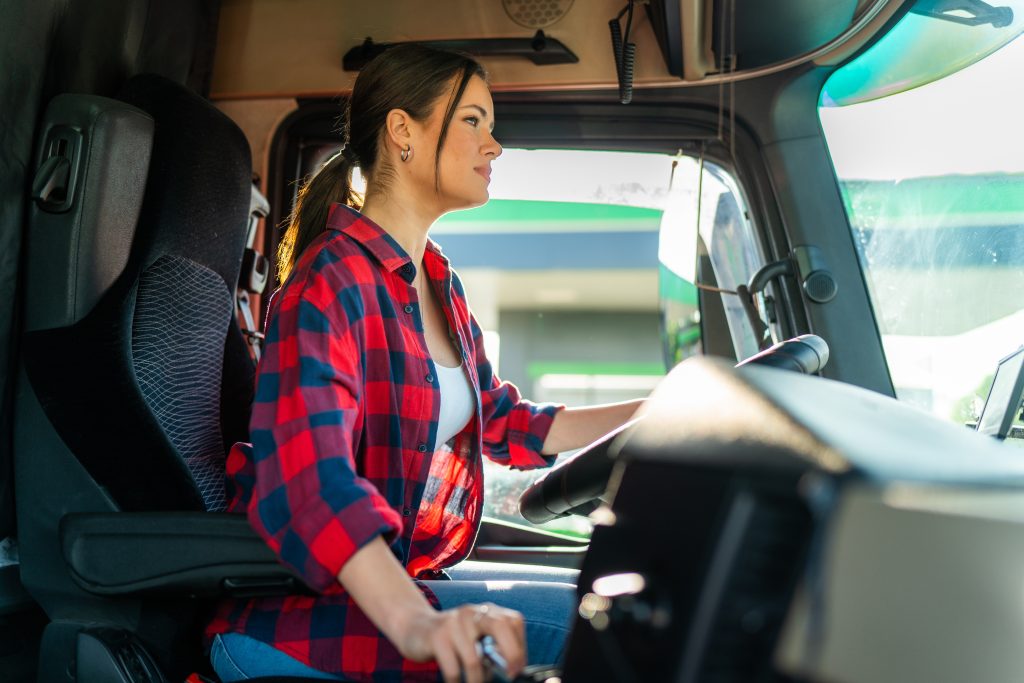Girl Power Behind the Wheel: The Rise of Women in Trucking
November 10, 2023

The trucking industry is changing, and this time, it’s all about women in trucking. For decades, trucking has been characterized as a male-dominated field, largely represented by men in both pop culture and employment statistics. But times are changing and changing fast. The arrival of female truck drivers is reshaping the industry’s identity, bringing in fresh perspectives, diverse skills, and a new culture around inclusivity and gender equality in trucking.
In this blog, we’ll explore various aspects of this change — from the history of women breaking into the industry to tackling stereotypes and the unique set of skills they bring to the table. We’ll also find out how ProDriverU CDL training is leveling the playing field, enabling more women to pursue a career in trucking.
So, if you’ve been curious about the evolving landscape of trucking and how women are becoming a force to be reckoned with, you’re in the right place. We’re going to dig deep into how CDL training for women is opening new doors, setting new standards, and ultimately contributing to diversity in trucking.
The Historical Perspective of Women Truck Drivers
For years, the iconic image of a trucker was almost exclusively male. Women truck drivers roles were rare exceptions rather than the rule, often overshadowed by their male counterparts. This limited visibility reinforced the perception that trucking was an industry unsuitable for women.
However, during World War II, a shortage of male labor led to a significant shift in the trucking industry. Women stepped up to fill roles traditionally dominated by men, including trucking. This marked the beginning of women’s involvement in trucking. However, after the war, many women returned to more traditional roles, and the industry reverted to being male-dominated.
Over the decades, efforts for gender equality gained motion. Women continued to make inroads into the trucking profession, challenging stereotypes and breaking barriers. The industry gradually saw a more permanent shift in the late 20th and early 21st centuries, with more women pursuing careers as truck drivers and contributing to the evolution of the industry.
The advancement in CDL training to also include women was a game-changer, offering a structured path for entry into the industry. ProDriverU CDL training, among other programs, has been instrumental in this regard, providing specialized training for women who wish to become professional drivers.
Now, women are not just behind the wheel but also in leadership roles — running logistics, overseeing operations, and even owning trucking companies. This evolution reflects a broader shift toward diversity in trucking, adding multiple layers of talent and perspectives that enrich the industry.
Breaking the Stereotypes
When it comes to women in trucking, stereotypes and misconceptions have often stood as roadblocks. Let’s break down some of these myths and reveal the facts:
- Women Can’t Handle Big Rigs: One common misconception is that women are not physically capable of handling large vehicles. However, CDL training for women proves otherwise. Physical strength isn’t the sole requirement; technique and skill are equally important.
- It’s Too Dangerous for Women: Another stereotype is that trucking is too risky for women. While safety concerns are valid for anyone on the road, female truck drivers have proven to be just as competent in navigating these challenges.
- Women Aren’t Interested: Some may think that women simply aren’t interested in a trucking career. But the increasing number of women enrolling in ProDriverU CDL training contradicts this assumption.
- Men Are Better Drivers: A pervasive myth is that men are naturally better drivers. However, statistics on safety records often show that women are equally safe, if not safer, in certain aspects of driving.
- Lack of Career Progression for Women: This stereotype assumes that women can’t climb the career ladder in trucking. Yet, more women are taking on managerial roles and even owning trucking companies, contributing to gender equality in trucking.
- Women Only Join Due to Family Ties: While family connections might be a way some women enter the field, many join out of genuine interest and the lure of good pay and career stability.
By debunking these stereotypes, we pave the way for greater diversity in trucking. Understanding the facts helps create a more inclusive environment where women can succeed.
Skillset and Safety
When it comes to making a mark in the trucking world, skills and safety records are key indicators of a driver’s competence. Let’s look at how women do in these aspects:
- Attention to Detail: Women often excel in paying close attention to the finer details, whether it’s adhering to traffic rules or handling cargo with care. This skill is essential in the trucking business where minor errors can lead to significant issues.
- Risk Aversion: Studies have shown that women are generally more risk-averse compared to men when behind the wheel. This attitude translates into safer driving habits, reducing the likelihood of accidents.
- Communication Skills: Effective communication is essential on the road, especially in emergency situations or while coordinating with logistics centers. Women often excel in this skill, making them valuable assets in trucking operations.
- Emotional Intelligence: The ability to manage one’s own emotions and understand those of others can be particularly useful in high-stress scenarios like trucking. Female truck drivers frequently demonstrate high emotional intelligence, leading to better decision-making on the road.
- Safety Records: While exact statistics can vary, it’s worth highlighting that women often have better safety records. Their tendency for caution and rule-following often results in fewer violations and accidents.
By bringing these unique skills to the table, women contribute positively to the trucking industry, making a strong case for gender equality in trucking. The qualities women possess not only make them excellent drivers but also invaluable members of the trucking community, adding to the growing diversity in trucking.
Training and Opportunities
The trucking industry is bustling with opportunities, and it’s crucial for aspiring drivers to get the right training to capitalize on them. If you’re a woman considering a career in trucking, know that specialized CDL training for women is not just available but increasingly popular and effective.
ProDriverU’s Role in Facilitating Training for Women
ProDriverU CDL training has been a significant player in helping women get their foot in the trucking door. Its tailor-made courses are designed to accommodate the unique learning needs and challenges that women might face, thereby bridging the gap between potential and opportunity.
- Focused Curriculum: ProDriverU offers courses that are directly relevant to the challenges and demands of being a female truck driver. Its curriculum goes beyond just learning how to drive and includes modules on safety, vehicle maintenance, and even interpersonal skills.
- Flexibility: Understanding that many women balance multiple roles, ProDriverU provides flexible schedules, including weekend and evening classes, making it easier to fit training into a busy life.
- Supportive Environment: The training programs also feature a supportive, women-friendly environment that encourages active participation and learning.
Growth Opportunities in the Field for Women
Once armed with a CDL, the road ahead is filled with numerous growth opportunities. And we’re not just talking about being behind the wheel.
- Leadership Roles: More women are climbing the corporate ladder, taking on managerial positions, and even leading entire fleets. These roles were once almost entirely male-dominated but are now increasingly being filled by skilled and experienced women.
- Specialized Driving Opportunities: Certain trucking niches like refrigerated goods transportation and luxury vehicle towing offer higher pay and are becoming more accessible to women.
- Entrepreneurial Ventures: Owning a trucking business is no longer a far-fetched dream. With the right experience and networking, women are establishing successful trucking companies.
Women are making inroads in trucking at an unprecedented pace, thanks in part to specialized CDL training for women that equips them with the necessary skills and knowledge. The industry is gradually but steadily moving towards greater gender equality in trucking, and the unique skills that women bring are becoming increasingly recognized and valued.
Creating a More Inclusive Environment
As the trucking industry navigates the road to greater diversity in trucking, creating a more inclusive environment is key. Sure, training programs like ProDriverU CDL training are crucial entry points, but what happens afterward? How can the industry sustain this momentum? Let’s explore.
Steps That Companies Can Take
- Equal Pay Initiatives: Companies should take measures to ensure that female truck drivers receive equal pay for equal work, setting a standard for gender equality in trucking.
- Women-Friendly Facilities: Simple changes like clean, safe, and women-specific rest areas can make a world of difference.
- Mentorship Programs: Establishing mentorship programs within the company can help newly trained women drivers adjust and excel in their roles.
Industry-Wide Initiatives
- Promote Female Leadership: Celebrate and promote successful women in the industry. Representation matters and seeing more women in leadership roles will inspire others to aim high.
- Create Safe Reporting Mechanisms: Encouraging an open dialogue about challenges, including any forms of discrimination, is essential. Anonymous reporting mechanisms can make this process easier and more comfortable for women.
Existing Programs Aimed at Women
There are several programs and initiatives designed specifically for women in the trucking industry. For example, ProDriverU offers scholarships and financial assistance programs geared towards women. These programs not only make training more accessible but also show that the industry is genuinely interested in diversifying its workforce.
Through concerted efforts from both companies and the industry, the goal is to go beyond mere tokenism. It’s about acknowledging and utilizing the unique skills and perspectives that women bring to the trucking ecosystem. By creating an environment that’s conducive for women, the industry is not just ticking off a diversity-in-trucking checklist; it’s evolving into a richer, more balanced, and more effective space.
Conclusion
Over the years, the trucking industry has undergone significant changes, and the rise of female truck drivers is among the most noteworthy. From breaking stereotypes to excelling in safety and skills, women have proven time and again that they’re more than equipped for the job. Programs like ProDriverU CDL training are setting the stage for more women to enter and succeed in this career. And as the industry continues to open up, it’s also slowly but surely laying the groundwork for gender equality in trucking.
While challenges remain, the tide is clearly turning. Companies and industry bodies are recognizing the need for a more inclusive environment and are taking actionable steps to achieve it. The bottom line is that women aren’t just joining the ranks; they are influencing change, improving standards, and setting precedents.
If you’re a woman considering a career in trucking, there has never been a better time to make the leap. The opportunities are endless, and the support is growing. To find out more about training programs, opportunities, and benefits, feel free to visit ProDriverU or contact us for more information.
Disclaimer
The information in this article is for educational purposes only and is not intended as professional advice. For the most current and tailored information, please consult with ProDriverU or other qualified experts
Related Posts

“Should I Be A Truck Driver?” Decide if Driving is the Right Career for You
December 23, 2022
Do Your Research! Since you probably won’t have an opportunity for experiential learning before going out on the road
Read More
5 Safe Driving Tips for Bad Weather
Whether you are driving a car, a motorcycle, or an 18-wheeler, one of the scariest situations is driving during
Read More
Hitting the Road: Embracing the Adventure as an Over-the-Road Truck Driver
May 15, 2023
Welcome, future road warriors! Are you ready to take on the open road and embark on an exciting new
Read More